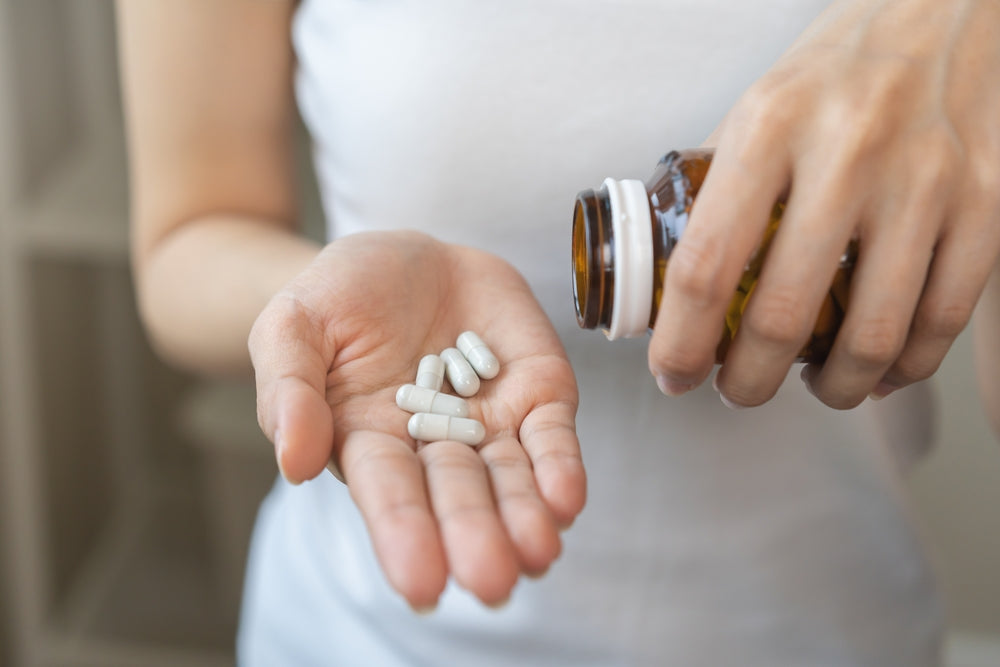
Your gut does more than just digest food.
It controls 70% of your immune system, produces 90% of your serotonin and directly affects your energy levels.
When your gut health suffers, everything else follows.
If you're dealing with bloating, irregular bowel movements, or constant fatigue, the right supplements can help restore balance to your digestive system.
This article explores seven science-backed supplements that can transform your gut health naturally.
How to Know You Need Gut Health Supplements
Your body sends clear signals when your gut needs support.
Frequent bloating and gas after meals suggest your digestive system is struggling to break down food properly.
Irregular bowel movements, whether constipation or diarrhoea, indicate an imbalance in your gut bacteria. Healthy digestion should produce regular, well-formed stools without discomfort.
Unexplained fatigue and brain fog often trace back to gut health. When your gut can't absorb nutrients effectively, your energy levels plummet and mental clarity suffers.
Food intolerances and frequent illness also point to gut problems. A healthy gut barrier prevents harmful substances from entering your bloodstream while supporting strong immune function.
7 Science-Backed Supplements for Gut Health
1) Probiotics
Probiotics are live microorganisms that replenish the beneficial bacteria in your gut.
These helpful microbes support digestion, boost immunity and maintain the delicate balance of your gut microbiome.
Key strains include:
Lactobacillus, which helps break down lactose and supports overall digestive health.
Bifidobacterium strains are particularly effective at reducing inflammation and supporting immune function.
Saccharomyces boulardii is a beneficial yeast that helps prevent digestive infections and supports gut barrier function.
Most probiotic supplements contain between 1-10 billion colony-forming units (CFU) per serving.
2) Prebiotics
Dietary fibres that nourish beneficial gut microorganisms are called prebiotics. Think of them as food for your good bacteria, helping them thrive in your digestive system.
Common prebiotic sources include inulin, resistant starch and natural fibres like psyllium husk.
These compounds pass through your small intestine undigested, reaching your colon where beneficial bacteria ferment them into short-chain fatty acids.
These fatty acids provide energy for your colon cells and help alleviate constipation and IBS symptoms.
Prebiotics work best when combined with probiotics, creating a synergistic effect for optimal gut health.
3) Digestive Enzymes
Digestive enzymes help break down food for better nutrient absorption. Your pancreas naturally produces these enzymes, but stress, age and poor diet can reduce their effectiveness.
Supplemental enzymes support the digestion of proteins, fats and carbohydrates. Protease breaks down proteins into amino acids, lipase handles fats and amylase processes starches and sugars.
Taking digestive enzymes with meals can reduce digestive discomfort like bloating, gas and indigestion.
4) L-Glutamine
L-Glutamine is an amino acid that repairs and protects intestinal lining. Your intestinal cells use glutamine as their primary fuel source, making it essential for maintaining gut barrier function.
This supplement helps heal a damaged gut barrier, often called "leaky gut." When your intestinal lining becomes permeable, toxins and undigested food particles can enter your bloodstream, triggering inflammation throughout your body.
L-Glutamine supports recovery from digestive stress caused by illness, medications, or poor diet.
It's particularly beneficial for people dealing with inflammatory bowel conditions or those recovering from antibiotic treatments.
5) Peppermint Oil
Peppermint oil relaxes intestinal muscles and reduces IBS symptoms through its natural antispasmodic properties.
The active compound menthol helps calm overactive digestive muscles that cause cramping and discomfort.
Enteric-coated peppermint oil capsules work best because they release the oil directly into your intestines rather than your stomach. This targeted delivery provides maximum therapeutic benefit where you need it most.
6) Ginger
Ginger has powerful anti-inflammatory properties that soothe your digestive tract. This warming spice has been used for centuries to treat various digestive ailments, from nausea to indigestion.
Fresh or dried ginger reduces nausea and digestive discomfort by speeding up gastric emptying. This means food moves through your stomach more efficiently, reducing feelings of fullness and bloating.
Ginger supports healthy digestion by stimulating digestive juices and promoting healthy gut motility. You can take ginger as a supplement, drink ginger tea, or add fresh ginger to your meals.
7) Vitamin D
Vitamin D is important for immune function and may support gut microbiota. This essential nutrient acts more like a hormone than a traditional vitamin, influencing multiple body systems including your gut.
Research shows strong links between vitamin D deficiency and digestive disorders. Low vitamin D levels are associated with increased risk of inflammatory bowel disease, irritable bowel syndrome and compromised gut barrier function.
Vitamin D supports overall gut barrier function by regulating immune responses in your digestive tract. Most people need 1000-4000 IU daily, but blood testing can help determine your optimal dose.
Remember Supplements are Supplementary
Supplements work best when combined with healthy lifestyle foundations. No supplement can replace proper nutrition, regular exercise, quality sleep and effective stress management.
Real fermented foods like kefir and kimchi offer advantages over probiotic pills. These foods naturally buffer stomach acids, helping more beneficial bacteria survive the journey to your intestines.
Whole plant approaches often provide superior results compared to isolated compounds. Cosmic Hue contains seven powerful whole plants in their natural form, working together synergistically.
Always consult your GP or healthcare provider before starting new supplements, especially if you take medications or have existing health conditions. Start with small doses to assess your tolerance and gradually increase as needed.
Conclusion
Probiotics, Prebiotics, L-glutamine, Digestive enzymes, Peppermint Oil, Ginger and Vitamin D are 7 supplements that offer science-backed support for gut health.
However, the most effective approach combines targeted supplementation with consistent daily habits like nutrition, exercise, sleep and stress management.
Please note this information is for educational purposes only, not medical advice. Cosmic Hue is not intended to diagnose, treat, cure, or prevent any disease. Always consult your healthcare provider before making changes to your health routine.

